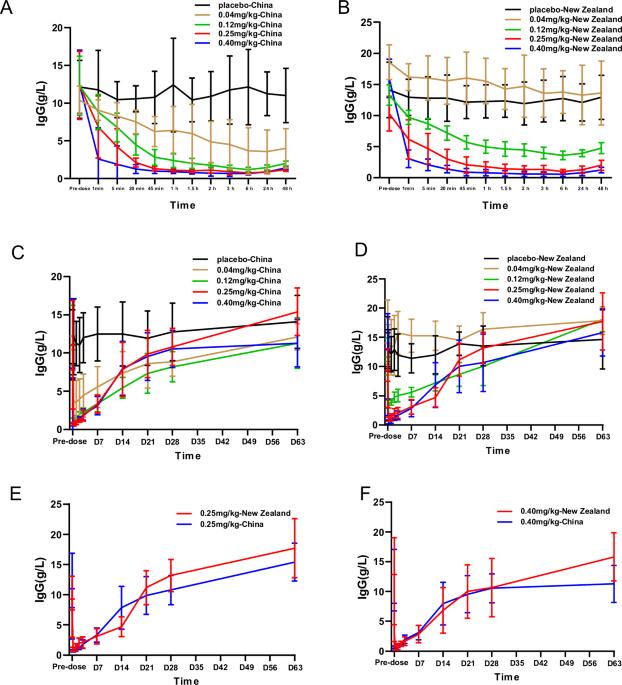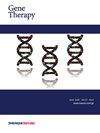Safety, efficacy, and immunogenicity of a novel IgG degrading enzyme (KJ103): results from two randomised, blinded, phase 1 clinical trials
IF 4.5
3区 医学
Q1 BIOCHEMISTRY & MOLECULAR BIOLOGY
引用次数: 0
Abstract
The approved intravenous adeno-associated virus (AAV) therapies are limited by the widespread prevalence of pre-existing anti-AAV antibodies in the general population, which are known to restrict patients’ ability to receive gene therapy and limit transfection efficacy in vivo. To address this challenge, we have developed a novel recombinant human immunoglobulin G degrading enzyme KJ103, characterized by low immunogenicity and clinical value for the elimination of anti-AAV antibodies in gene transfer. Herein, we conducted two randomized, blinded, placebo-controlled, single ascending dose Phase I studies in China and New Zealand, to evaluate the pharmacokinetics, pharmacodynamics, safety and immunogenicity of KJ103 in healthy volunteers. The results confirmed that KJ103 rapidly reduced IgG and maintained plasma IgG at low levels for one week. Dose of KJ103 ranging from 0.01 to 0.40 mg/kg had a favorable safety and tolerability profile across diverse ethnic and gender groups. KJ103 demonstrated a lower incidence of pre-existing anti-drug antibodies (ADAs) compared to currently approved human IgG degrading enzyme Imlifidase, with most induced ADAs predominantly reverting to baseline six months after administration. These properties are ideal for the management of immune disorders, rejection responses, and immunotherapies where pre-existing antibodies can reduce efficacy. Furthermore, we tested AAV2 neutralizing antibodies to confirm the potential utility of KJ103 in enhancing gene therapy.

一种新型IgG降解酶(KJ103)的安全性、有效性和免疫原性:来自两项随机、盲法1期临床试验的结果
经批准的静脉注射腺相关病毒(AAV)治疗受到普通人群中普遍存在的抗AAV抗体的限制,这些抗体已知会限制患者接受基因治疗的能力并限制体内转染的效果。为了解决这一挑战,我们开发了一种新的重组人免疫球蛋白G降解酶KJ103,其特点是低免疫原性,在基因转移中具有消除抗aav抗体的临床价值。在此,我们在中国和新西兰进行了两项随机、盲法、安慰剂对照、单次递增剂量的I期研究,以评估KJ103在健康志愿者体内的药代动力学、药效学、安全性和免疫原性。结果证实,KJ103快速降低IgG,并维持血浆IgG低水平一周。剂量范围为0.01 ~ 0.40 mg/kg的KJ103在不同种族和性别人群中具有良好的安全性和耐受性。与目前批准的人IgG降解酶Imlifidase相比,KJ103显示出较低的预先存在的抗药物抗体(ADAs)发生率,大多数诱导的ADAs在给药后6个月主要恢复到基线水平。这些特性是理想的管理免疫紊乱,排斥反应和免疫疗法,预先存在的抗体可以降低疗效。此外,我们测试了AAV2中和抗体,以证实KJ103在增强基因治疗中的潜在效用。
本文章由计算机程序翻译,如有差异,请以英文原文为准。
求助全文
约1分钟内获得全文
求助全文
来源期刊

Gene Therapy
医学-生化与分子生物学
CiteScore
9.70
自引率
2.00%
发文量
67
审稿时长
4-8 weeks
期刊介绍:
Gene Therapy covers both the research and clinical applications of novel therapeutic techniques based on a genetic component. Over the last few decades, significant advances in technologies ranging from identifying novel genetic targets that cause disease through to clinical studies, which show therapeutic benefit, have elevated this multidisciplinary field to the forefront of modern medicine.
 求助内容:
求助内容: 应助结果提醒方式:
应助结果提醒方式:


